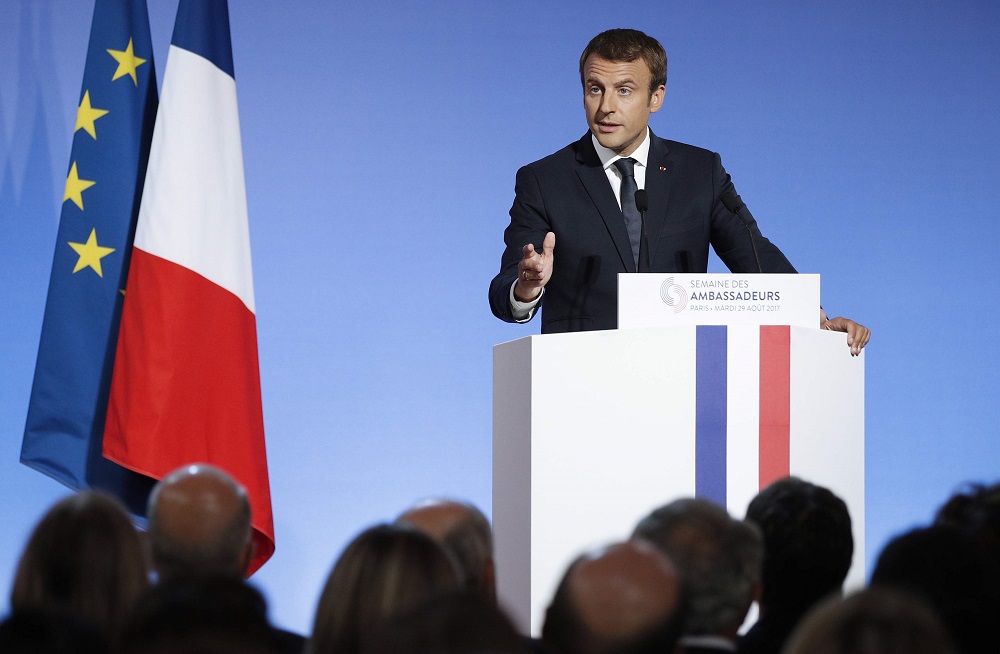Paris – In his first speech on France’s foreign policy, President Emmanual Macron paved the comprehensive and complete path of the diplomacy that Paris will follow over the next five years.
During his first annual address to France’s ambassadors, he covered world crises, ranging from the Middle East to North Korea, Africa and Venezuela and the fate of the European Union.
The foreign policy will be based on the France’s security and independence and various forms of influence throughout the world.
Macron indirectly implied that, since his election to office, France has restored its role in the world and its voice is once again being heard. He was making an indirect reference to his “successful” meetings with Russian President Vladimir Putin and US President Donald Trump and his initiative that brought together the rival forces in Libya.
The French leader declared that Paris wants to be the “bearer of solutions and initiatives upon the eruption of new crises.”
In addition, he revealed that a “work group” on Syria will meet after a few days in New York. He also told the ambassadors that Paris will host in early 2018 a conference on drying up terrorism financing and that he will pay a visit to the Middle East in spring of the same year.
Seeing as France and the French people top Macron’s concerns, terrorism took up most his speech that lasted over an hour. He stressed the need to combat terror that has been plaguing France since early 2015 and which has left 239 people dead and hundreds injured.
“Combating Islamist terrorism is at the top of our foreign policy priorities,” he stated, while acknowledging that labeling this terrorism as “Islamist” will incite criticism. He was therefore quick to clarify that he distinguishes between Islam and “Islamist” terrorism, rejecting that the millions of Muslims in Europe be blamed for this violence.
Echoing the words of his predecessor Francois Hollande, Macron declared ISIS as “the enemy of France.” He also made a link between destroying ISIS and terrorism to finding comprehensive political solutions in each of Syria and Iraq.
“Restoring peace and stability in Iraq and Syria are of vital importance to France,” he declared. To that end, he called for working towards a stage of political transition in both of the war-torn countries.
One of the ways to defeat “Islamist” terrorism lies in drying up its financing, explained the French president. He therefore stressed that any side funding terror should not be overlooked.
Macron avoided delving into the details of the Gulf crisis between Qatar on the one hand and Saudi Arabia, the United Arab Emirates, Bahrain and Egypt on the other. He also refused to view the conflicts in the region from a “Sunni-Shi’ite” perspective. The strength of French diplomacy lies in its ability to speak to all sides in order “to bring together the elements of stability and effectively combat all forms of terror financing.”
In addition, the French leader refused to follow the United States’ campaign to abandon the Iranian nuclear deal, saying that he is committed to its implementation to prevent the proliferation of nuclear weapons.
On Syria, Macron had in May spoken of a French “initiative” on the war-torn country that calls for forming a “contact group” comprised of the major powers and influential regional players. On Tuesday, he said that this group will become “active” in September and that it will meet on the margins of the United Nations General Assembly. He did not specify whether Syria will be represented by the regime or the opposition at the meeting.
French diplomatic sources told Asharq Al-Awsat that one of the difficulties Paris faced in coming up with the initiative was the mounting tensions between Tehran and the American administration, which refuses to sit at the same table with Iranian officials.
Macron said that it was “a given” that a state of law will once again be formed in Syria, which is what France and Europe are working towards. Furthermore, he added that this should be accompanied with the “trial of figures responsible for the crimes committed there, specifically its leaders.” This marks the first time that the new French president makes such a demand, which is significant since he had refrained in the past from calling for the ouster of regime head Bashar al-Assad.
On Lebanon, Macron said that Paris is “very aware” of the special ties it enjoys with Beirut, noting that the country is “bravely” confronting a critical situation.
Lebanese President Michel Aoun is scheduled to visit Paris in late September, while Prime Minister Saad Hariri is set to make a similar visit in the upcoming days.
Turning to the Palestinian-Israeli conflict, Macron expressed his commitment to the two-state solution and his country’s efforts to reaching that goal. He revealed that he will visit each of Lebanon, Jordan, Israel and the Palestinian territories in spring 2018.
As for Libya, the French president described it as a “safe haven for terrorists.” He also highlighted the agreement that he was able to mediate between rival leaders Prime Minister Fayez al-Sarraj and Field Marshal Khalifa Haftar in the Paris suburb of Saint Cloud on July 25.
